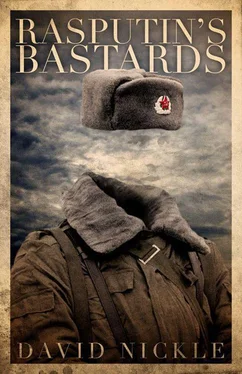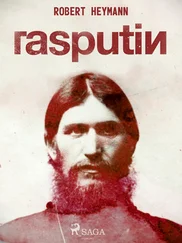“ You think that, do you ?”
“Why shouldn’t I? What are you getting at?”
“ I cannot stay long here. The others will begin to suspect. Things are not as fine as we thought they were, my cousin. Not as fine. This place — it was a trap for us .”
“A trap?”
“ I cannot stay .”
“No. Don’t drop that on me without more explanation.”
“ But you. You stick it out a little longer, Kilodovich. You’re not at the end of things yet .”
“Vladimir! Vladimir! I have a question yet.”
“What did you mean by cousin?”
Alexei came to in a little room that was not his school. He was there with the Caucasian girl, the general and two of his assistants. And Kolyokov, who stood by Alexei. They stared at him.
“Is this one of the ‘artefacts’ you were talking about?” asked the General.
Kolyokov looked down at Alexei. “I confess I don’t know. I haven’t seen that before.”
The General gave Kolyokov an approving look. “That is a good answer, Comrade. I find that too many of the men I deal with will try to conceal a problem — brush it over — when I ask about it. It is good, Comrade, that you are so honest about your project’s shortcomings. It makes all of our tasks so much easier.”
“I don’t know that it is a shortcoming. But we are on the edge of discovery in this place. Each new class going through here reveals a new vista.”
The General smiled and looked sidelong at one of his aides, who marked something down on a clipboard. “Quite right, Comrade Kolyokov. It is like your other class — the dream-walkers, yes? They become more powerful with each passing year. Each passing generation. Soon — soon, they will win us the West. The Motherland will be triumphant.”
Kolyokov was silent.
“Dreams,” said the General. “I leave dreaming to others. Let us see what these ones here can do. With their hands.”
“Very good, sir,” said Kolyokov. There was an odd resignation in his voice. It was the voice a man bound for the gallows, thought Alexei. He thought General Rodionov might have detected it also, the way his smile broadened.
A door opened behind Alexei. Two men in dark uniforms came in, leading a third — an old man whose whitening beard reached his collarbone. Dressed in dark brown prison clothes. He looked warily around the room as they led him to its middle.
The General and he met gazes.
“Comrade,” said General Rodionov.
“Rodionov.” The old man spat as he said it.
“I trust your journey was comfortable.”
“Fuck yourself, Rodionov.”
General Rodionov smiled and shook his head. The old man looked around him once more. He seemed to be counting. Finally, he spoke:
“This is to be my execution, then?” he said. “Here, in this little room? With these people present? This old man? This girl? This—” he motioned to Alexei contemptuously “—this boy? ”
“You prefer a bullet in your head?”
Alexei felt his palms beginning to sweat. He could not look at the old man, he found.
Kolyokov was also clearly uncomfortable. But he knew what he had to do. “Tanya,” he said to the other Caucasian girl.
She didn’t even look at Kolyokov. Her eyes, already dim lights, clouded and darkened, and she began to move forward. Alexei saw her hands make a claw — the frame of her shoulder tense — the old man, seeing what was to happen, suddenly lose his composure the way that men do when faced with their deaths — and the General, still smiling, and now nodding to himself with a terrible knowledge.
Alexei lurched forward. The girl was older than he — maybe seventeen — twenty centimetres taller and at least as strong. But he caught her in the small of the back, and in the thrall of her programming — and it was enough to cancel her natural advantages. She fell forward onto the concrete floor, Alexei on top of her. She twisted underneath him, swung a clawed hand toward his eyes. Alexei managed to deflect the blow, so her nails simply scored sharp red lines across her forehead. Before she could attack again, he reared back and flung himself, elbow first, into her chest. She made an odd whooshing sound, went briefly limp, and began to cough. Alexei grabbed first one hand and then the other, and pressed both hard against the concrete. She made a strangling noise and glared up at him with eyes that seemed not her own.
Breathless, Alexei looked up. Kolyokov was glaring at him, his mouth working speechlessly. The old man was looking at him too — with gratitude and relief. He was nodding at him: Good lad , he was thinking. Good, good lad. Fuck them, hey? Fuck their benighted Party. We will drink vodka in gulag together, hey lad? Good lad.
General Rodionov had crossed his arms, and forefinger and thumb cradling his chin. He wasn’t looking at Alexei, or the old man, or any of the other pupils here. Just Kolyokov. After a silence that seemed eternal, Comrade General Rodionov cleared his throat.
“I go to a Gypsy fortune teller,” he said quietly. “Ask her to tell me the future. She says, I will do so, Comrade. Give me two hundred rubles. Very good, I say. I reach into my coat. She looks at my hand expectantly — for surely I am reaching for my purse, where all those rubles are waiting for her. Instead — I take out a pistol. I hold it up to her forehead and fire twice. And she is dead. Brains spread across the back of her tent.
“It is no great waste. Those brains, it seems, had little knack for the telling of fortunes. Had they, they would have told her of the gun days ago, and she might have seen her own sad fate. She might have taken precautions.
“You are like that fortune teller, Fyodor Kolyokov. But in a different way. I bring my old friend here and give you every indication he is to be killed. I give him every indication this is so. And so naturally, you set your girl about to kill him.
“But I do not wish him killed. Why should we kill him? This—” he motioned to the old man “—this is my long-time Comrade. I have read all his novels. His poetry is a delight to the senses. We have so many more conversations to have before either of us is permitted to die. So there is no good reason. I don’t wish him dead. This is topmost in my mind. And do you have the wit to stop the killing? Do you read my mind, and stop it yourself? No. It is left up to this—” he motioned toward Alexei “—this one, who so far as any of us know simply disapproves of killing old men for no good reason, to stop the execution. What am I to make of this?”
Kolyokov’s face was reddening. He opened his mouth and shut it again.
“Did you perhaps dream-walk this one—” he pointed again at Alexei “—that is the term you use, isn’t it? Did you dream-walk him to prevent the needless killing? No. You are wide awake the whole time — not in your little piss tank. I watch you.”
“Speechless, Kolyokov?” smirked one of the aides.
“You must know, Comrade General Rodionov,” said Kolyokov finally, “that the City 512 dreamers do not work that way.”
“Oh, but my Comrade. I do know that. That is why I am here.” He looked back at Alexei, who was still trying to restrain the girl. “Why don’t you take these pupils of yours back to their cells? We have a great deal to discuss before we leave here, and there is no point in involving more innocents .”
As if on cue, the old man began to weep softly. Alexei let go of the girl. She stood and brushed herself off. Kolyokov nodded, and under his orders, the three of them left the room. By the time he had stepped out the door, Alexei was already gone from City 512, and back at school.
In his brief absence, the classroom of his metaphor had become more real again. The ceiling was now criss-crossed with tiles and the buzzing, clicking fluorescent lights that Alexei remembered so well. The windows looked out on a frozen wasteland of tundra and snowflakes. He had classmates, too. At the front of the classroom, seated behind his desk, the evil math instructor Czernochov made notations in a great ledger.
Читать дальше












